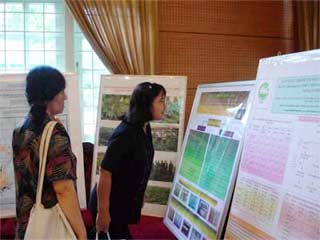Over 100,000 new products from the scientific research and biotechnology development program (KC.04), phase 2001-2005, have been transferred to production. This result was announced at the program’s closing conference held on the morning of June 28 in Hanoi.
 |
|
Exhibition of achievements from the KC.04 Program phase 2001-2005. (Photo by Minh Sơn) |
One of the notable projects is the successful production of Cefotaxime sodium, a third-generation antibiotic used to treat various dangerous infections today.
This new antibiotic meets international standards and is the first to be produced by the pharmaceutical corporation in Vietnam, using domestically sourced microorganisms.
Another project focused on the isolation and selection of several indigenous strains of microorganisms capable of strongly degrading specialized defense waste, which are difficult to decompose, such as TNT and nitroglycerin explosives. Remarkably, the scientists involved in this KC.04-10 project have developed five microbial formulations that effectively degrade these substances in a short time.
These projects are part of 34 topics and 13 pilot projects aimed at building the capacity of biotechnology (BT), applying modern BT to serve the development of agriculture, healthcare, and establishing Vietnam’s biotechnology industry during the 2001-2005 phase. It is reported that 22 patents and useful solutions from the KC.04 Program have been registered and protected.
According to Professor Dr. Nguyễn Quang Thạch from the Program Management Board, the KC.04 program phase 2001-2005 has evolved towards modern biotechnology, focusing on gene technology. The proportion of projects using molecular biology methods is 53.19%. This shift is significant, allowing Vietnamese biotechnology to keep pace with the modern global biotechnology landscape.
Professor Dr. Trần Duy Quý, the Program Director, stated that the KC.04 Program has closely followed societal changes. The annual tasks of the Program are timely and address pressing issues of society, such as foot-and-mouth disease, dengue fever, acute respiratory infections, and identifying the remains of fallen soldiers.
However, Professor Quý acknowledged that there are still some shortcomings that the KC.04 Program needs to address in the upcoming phase. There have not yet been groundbreaking scientific and technological projects or products serving agriculture, forestry, health protection, and the environment. The collaboration between research institutions and scientists is still weak, lacking the collective strength to tackle interdisciplinary projects effectively. More results need to be applied in the important technical economic sectors of the country.
Minh Sơn


















































